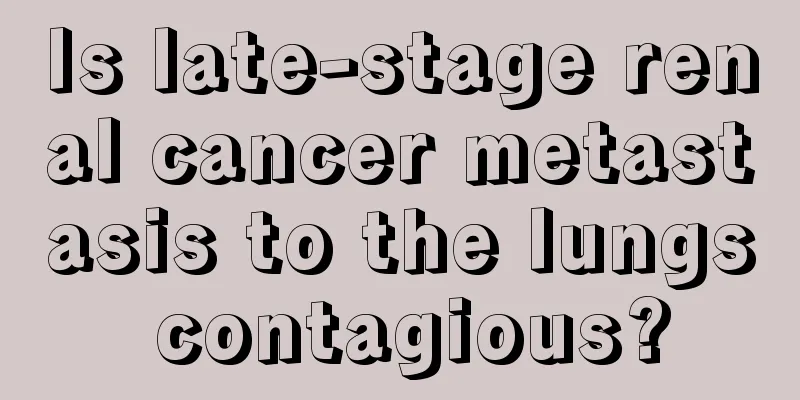Does renal hamartoma require surgery? Introduction to non-surgical treatments for renal hamartoma

|
Renal hamartomas are mostly benign lesions originating from the renal cortex, which progress slowly and rarely metastasize. The tumor is mainly composed of blood vessels, smooth muscle and adipose tissue, of which adipose tissue can account for more than 80% of the entire tumor. Renal hamartomas generally have no obvious symptoms and are often discovered through examinations. Surgical treatment is not necessary for small renal hamartomas without obvious symptoms. Common non-surgical treatments include regular observation, arterial interventional embolization, radiofrequency ablation, etc. Renal hamartomas are mostly benign lesions originating from the renal cortex. The specific cause is unclear, the lesions progress very slowly, and basically do not invade surrounding tissues or metastasize to distant sites. The tumor is mainly composed of blood vessels, smooth muscles and adipose tissue, of which adipose tissue can account for more than 80% of the entire tumor. Renal hamartomas generally have no obvious symptoms. If the tumor ruptures and bleeds, there may be low back pain with or without gross hematuria. So, does renal hamartoma have to be treated surgically? What are the non-surgical treatments for renal hamartomas? For renal hamartomas with a tumor diameter of less than 4 cm and no obvious symptoms, regular checkups can be performed, with a renal CT scan about every six months to monitor changes in the tumor. If there are no obvious changes in the tumor, regular observation can continue. If the tumor grows rapidly or ruptures and bleeds, surgical treatment is required. Before surgical treatment, the primary consideration should be to preserve renal function as much as possible. With the recent development of medicine, patients with tumors smaller than 4 cm with mild symptoms but stable vital signs who do not want to undergo surgery can also choose renal artery interventional embolization or radiofrequency ablation. The risks of these two methods are relatively small, with less trauma to the body, more definite efficacy after treatment, and a short recovery period after treatment, and can protect kidney function to the greatest extent. However, if arterial interventional embolization or radiofrequency ablation is ineffective, surgical treatment is the only option. For renal hamartomas with a diameter greater than 4 cm but no obvious symptoms, surgical treatment, arterial interventional embolization, or regular observation and treatment can be selected. However, as the tumor gradually grows, the possibility of spontaneous rupture and bleeding also increases, so surgical treatment is recommended for renal hamartomas of larger size. The above briefly introduces some indications for surgical and non-surgical treatment of renal hamartoma and the selection of non-surgical treatment methods. Smaller renal hamartomas can be observed regularly. If the tumor is significantly enlarged, surgical treatment is required. In recent years, arterial interventional embolization and radiofrequency ablation have also achieved good results. For patients diagnosed with renal hamartoma, it is best to go to the hospital for treatment under the guidance of a specialist. |
<<: What is the difference between renal hamartoma and renal cyst
>>: Does a 6cm renal hamartoma require surgery? How big a renal hamartoma requires surgery?
Recommend
Cervical cancer is mostly caused by viral infection
Cervical cancer is mostly caused by viral infecti...
What kind of tea is Xiaoqinggan
The small green orange we often talk about is act...
The function of toothpaste
Toothpaste is a very important part of our lives....
What does blood lipids include?
When people reach old age, they are very likely t...
How to choose a hospital for the diagnosis and treatment of bladder cancer
We have a lot of doubts about the occurrence of b...
Psychological nursing goals for breast cancer
Breast cancer makes many women very painful. Nowa...
What causes toothache when eating hot or cold food?
Oral diseases are very common diseases. Some peop...
How many root canals does a tooth have
Root canal treatment of problematic teeth is a re...
What are the effects of ginseng seeds
Ginseng seed is the name of a traditional Chinese...
What are the causes of gynecological teratoma
The occurrence of gynecological teratomas may be ...
What are the symptoms of potassium poisoning?
Potassium is one of the common trace elements in ...
Is hamartoma harmful to the human body?
Hamartomas grow in many parts of the body, such a...
How to remove acne marks faster
Many teenagers who are in puberty will develop ac...
Why do women get ovarian tumors
Ovarian tumors are one of the most common tumors ...
14 of the dirtiest daily necessities
Core message: We all know that sanitary environme...









